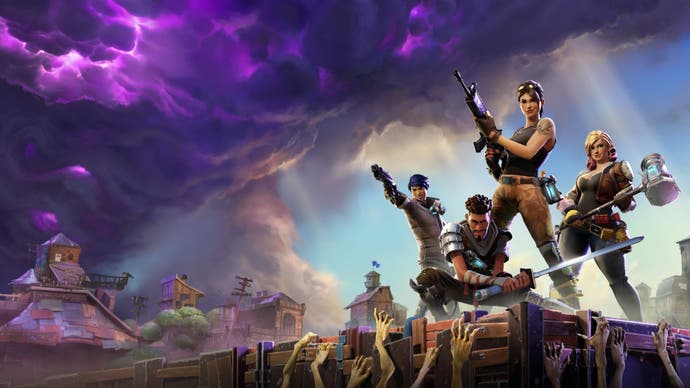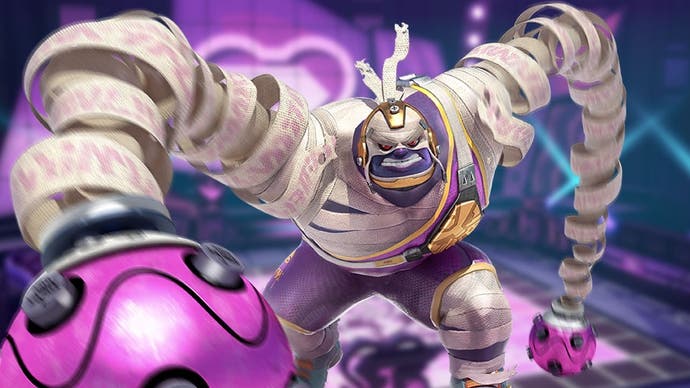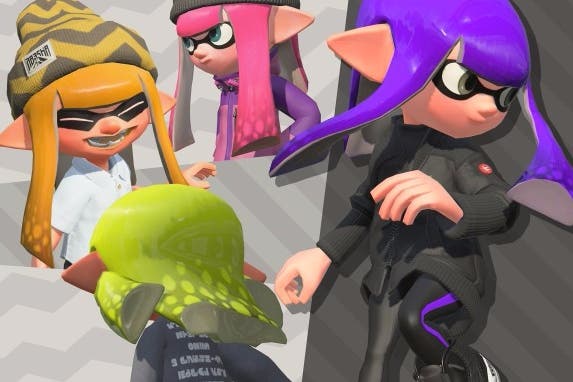The year in playing together
Don't get cooked!
If you had asked me at the start of this year what I thought a year spent playing multiplayer games would look like, I probably would have talked about muting people and about the frustration of being shot from halfway across the map by someone I couldn't even see. Crucially, I wouldn't have thought of Hearthstone or Diablo or any of the other multiplayer games I have always loved, because multiplayer - online multiplayer - for me still meant the unexamined cliches I had carried with me for years. Multiplayer was something I did not do, so the multiplayer games I already played all the time must be something subtly different.
I would love to say that this year I had an awakening, but there is nothing personal about it. 2017! There have been cheap tricks and huge games sunk by loot boxes, but my colleagues will be covering that stuff. And it's worth remembering that 2017 is also the year that even a fool like me could not fail to notice that so many of the cliches surrounding online gaming - particularly online shooters - are no longer as firmly rooted in the ground as they once were. And maybe they haven't been for some time.
In fact, a lot of my year - a year spent playing multiplayer games, as it happens - looked nothing like I would have expected it to. For an awful lot of it, I was hidden in shrubbery or taking long walks in the wilderness. Then there was downtown, the lights, the stores, the sidewalk cafes. Then there were those crazy, telescoping limbs. Again: not just me. This has been an incredible year for multiplayer games, and it's all hinged on the sheer variety and invention that's out there right now.
2017! A year in which the undisputed mega-hit of all mega-hits has been a game about bailing out of a plane with ninety-odd randoms and trying to whittle them down until there's nobody left. I played PlayerUnknown's Battlegrounds quite a bit, inevitably. There were distant headshots and lots of muting, but I also had some sweet, lonely, wistful adventures and discovered that the real thrill to PUBG was not the prospect of a perfect target presenting itself across a massive distance so much as it's the sheer range of things the game supports - the sweetness, the loneliness, the wistfulness. I played Fortnite's Battle Royale mode too, and once spent so much time AFK while sat in a thicket that by the end of the match there was just me and one other player left, and then, a happy accident later, there was just me. It was fun - both games are fun, and they both remind me of a thing I once heard on an old episode of This American Life. I heard that the outdoor worlds that our children enjoy are far smaller than the outdoor worlds that we enjoyed as kids. Our children stay closer to home where the helicopter parents hover and fret. Maybe PUBG is their best hope at a glimpse of the natural world, however mediated, however unnatural.

I'm probably not onto something there - I certainly hope I'm not. And anyway, although Battlegrounds was the biggest multiplayer game of the year, it was only a part of what made 2017 so particularly convivial.
Splatoon 2 was another game that helped define the year on online play. Splatoon 2 is allegedly a shooter, but it is not really a game about shooting people. It is a game about transforming the environment, and that slightly tilting of the rules, of the objectives, created sufficient space in which someone like me - tentative and clumsy and prone to wandering around looking at my feet - could find something useful to do.
Crucially, Splatoon does not look like other online shooters, either, and I think it is part of a mini-trend in online games in this respect. Splatoon is a place, a single coherent urban wonderland, and it feels like a place from the first moment you land in Inkopolis Square and see fellow players milling around you, see the doodled scrawls that bring their inner thoughts to life, and see the outfits they have chosen to wear - for the bonuses they deliver, sure, but also for the sheer love of self-expression.
Man, more games should be like this. They should think about how to turn menus and lobbies into shoe stores and food trucks. They should think about how the potential to build the right kind of community does not begin on the battlefield but with everything you go through before you reach the battlefield. Splatoon's kept me playing for so long not just because it is a brilliant game - and it is of course - but because it's a little world, and to stop playing would be to leave that world behind. There are rules to this world and, like Animal Crossing, another of Nintendo's bottle universes, it has its own sense of time. If I want to play in a Splatfest, I have to wait for a Splatfest to come along, and so I find myself waiting, and getting excited, and putting in much more effort than I usually would. If I want to play a little PvE, I need to wait for the terrible, gruelling, low-paying PvE job that is Salmon Run to become available again. I need to fight through the muck and slime with a weapon that I have not chosen and would not choose, and wearing clothes that protect my normal clothes and leave me feeling even more oppressed than I would in the presence of the horrible beasties I am meant to be dispatching. Salmon Run isn't merely a brilliant take on Horde mode, it's a repositioning of Horde mode, a reframing of it, a restaging of it, and one that's so successful it's only now as I write this that I finally realise: oh yeah, Salmon Run is Horde mode. I put up with indignities I never normally would in Splatoon because they are so gloriously contextualised.

Unusual mechanical ideas and a creative reframing of the whole thing: this is multiplayer games in 2017 if you ask me. I'm sure there's some of this in Destiny 2 and COD and Overwatch and LoL and all the other multiplayer games I have missed out on and continue to miss out on. It's definitely there in the curios I have been drawn towards, though. In between Splatoon, I often play a few rounds of Atomega. This is another lovely, unexpected delight. It's deathmatch, I suppose, except you can win without killing anyone. Instead, you are dropped into a spacious, intricate, multi-threaded map, and tasked with growing, evolving from a single-celled organism to a tottering, angsty, electrical god. Man, it is something else.
It really is. In fact, it's Cosmic Supermarket Sweep, and much of its power comes from things that exist beyond the map design and the ways that the rules clip together. Atomega takes place in the last few minutes of the life of the universe. As you play, the final remaining sun grows and throbs in the sky, and the end of the match is signalled by the end of all life in creation. This is such a tiny, throwaway detail, until you're playing and you realise that it isn't tiny or throwaway at all, that it makes the game something important and bold - a playful thumbing of the nose at the second law of thermodynamics. The biggie. Atomega is a means of dancing on the decks of Entropy. Context again!
All of that entropy stuff sounds a bit serious, of course, which would be a terrible miscategorisation on my part. Thankfully, here comes Arms, the last of my enlightening multiplayer delights in a year of enlightening multiplayer delights, and there is absolutely no danger of taking Arms seriously at all.
Or is there? In fact, my big takeaway from Nintendo's stretchy, elasticated fighting game, is that the presence of other players in a game sometimes makes it easier for you to think about that game in mechanical terms, to think of the stuff that makes it work and the things it is really trying to do. I am currently convinced that Arms works because of the length of your arms. It's a game about committing to a move, and then hoping - as your fists race away from your body and towards their target - that the move you have committed to has not been anticipated. Arms is Poker, basically. Maybe many fighting games are Poker? This is the kind of connection I would never have made if I hadn't started playing games with other people.
To put it another way, a lot of single-player games get away with stuff. This is my main takeaway from this year, I think. A single-player game can fool you or blind you or get one over on you in some way if it has distracting qualities of sufficient power to mask the wound in its heart. Multiplayer games have to be better than that, just to be any good at all. They have to work out of the box and they have to have the rules and the ideas and the sense of themselves that will propel them to the top. It's evolutionary. They need to be good just to survive - which is probably why we're starting to see all these loot boxes cropping up: another means of revenue, sure, but also a finger on the scale, a temptation towards addictive behaviour that can maybe keep something sub-par afloat a little longer.
2017 has been an astonishing year for games - that much was obvious even a few months in. What has surprised me, though, is how much time I spent in 2017 playing with other people - and how brilliant playing with other people has been. As long as you forget about the loot boxes.









